人教版八年级下册英语Unit 5 What were you doing when the rainstorm came知识点(含短语 句型 精讲 作文)
文档属性
| 名称 | 人教版八年级下册英语Unit 5 What were you doing when the rainstorm came知识点(含短语 句型 精讲 作文) |
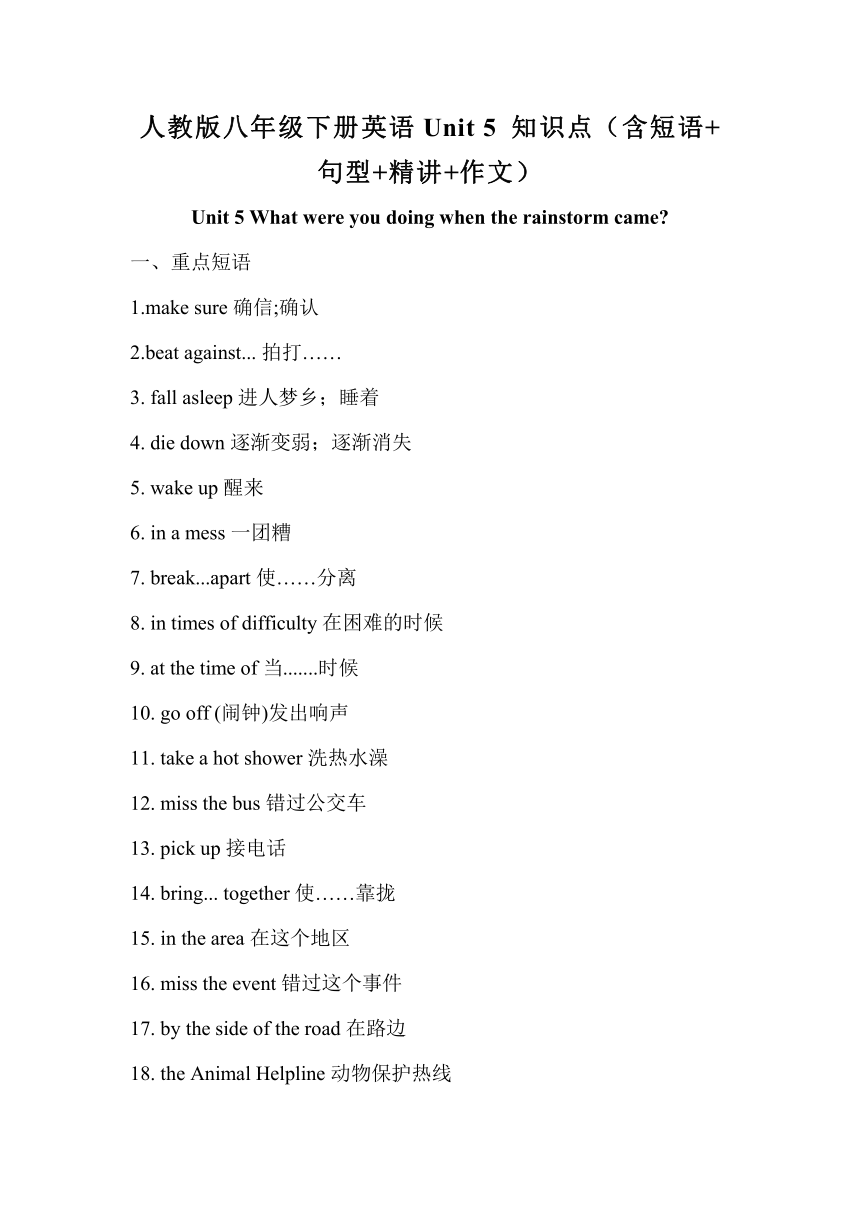
|
|
| 格式 | docx | ||
| 文件大小 | 27.1KB | ||
| 资源类型 | 教案 | ||
| 版本资源 | 人教新目标(Go for it)版 | ||
| 科目 | 英语 | ||
| 更新时间 | 2024-10-09 00:00:00 | ||
图片预览

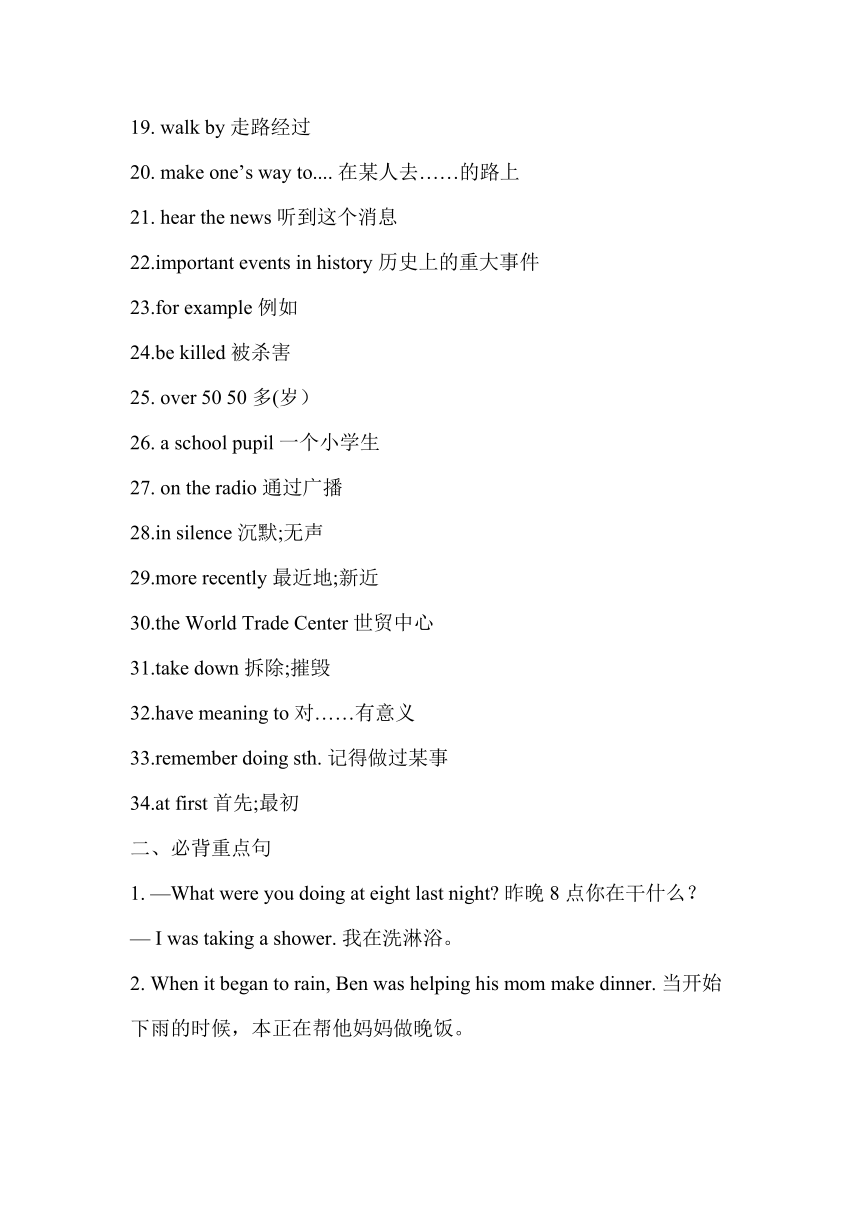
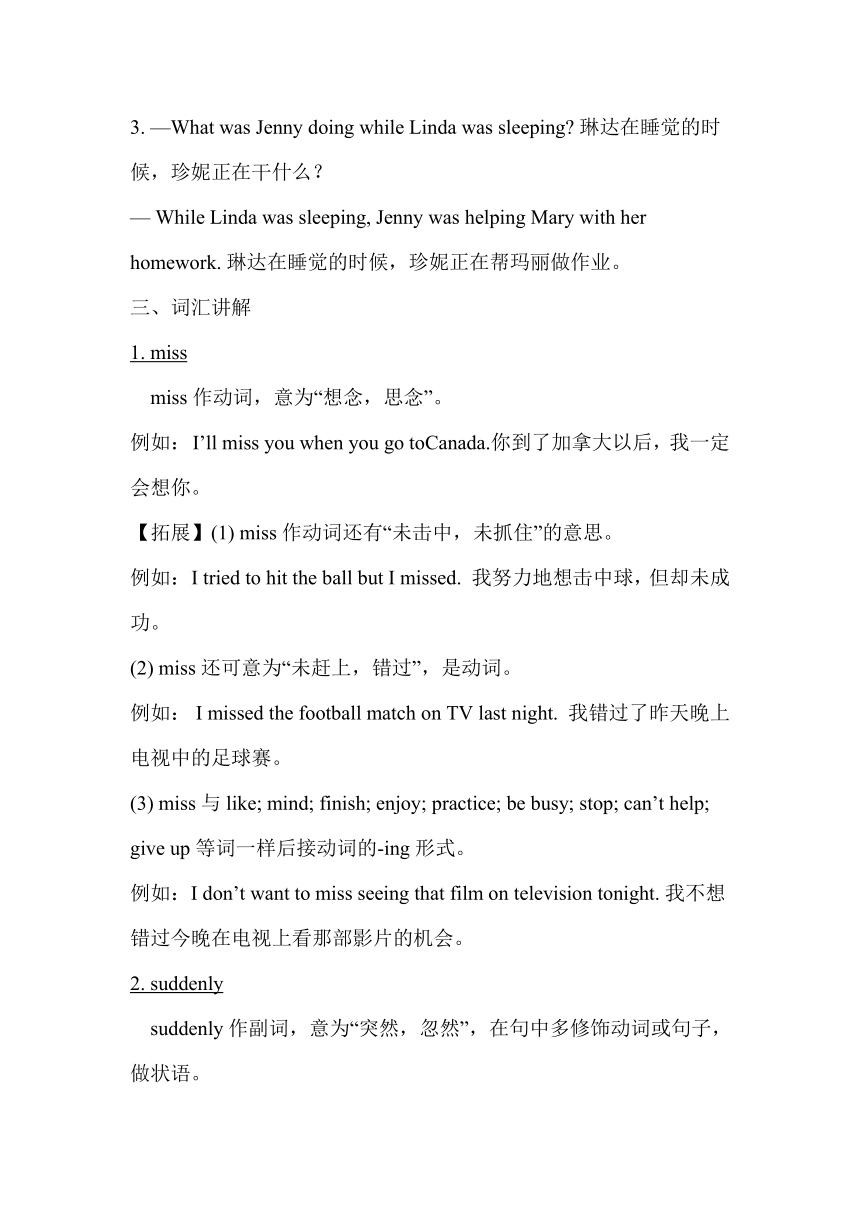
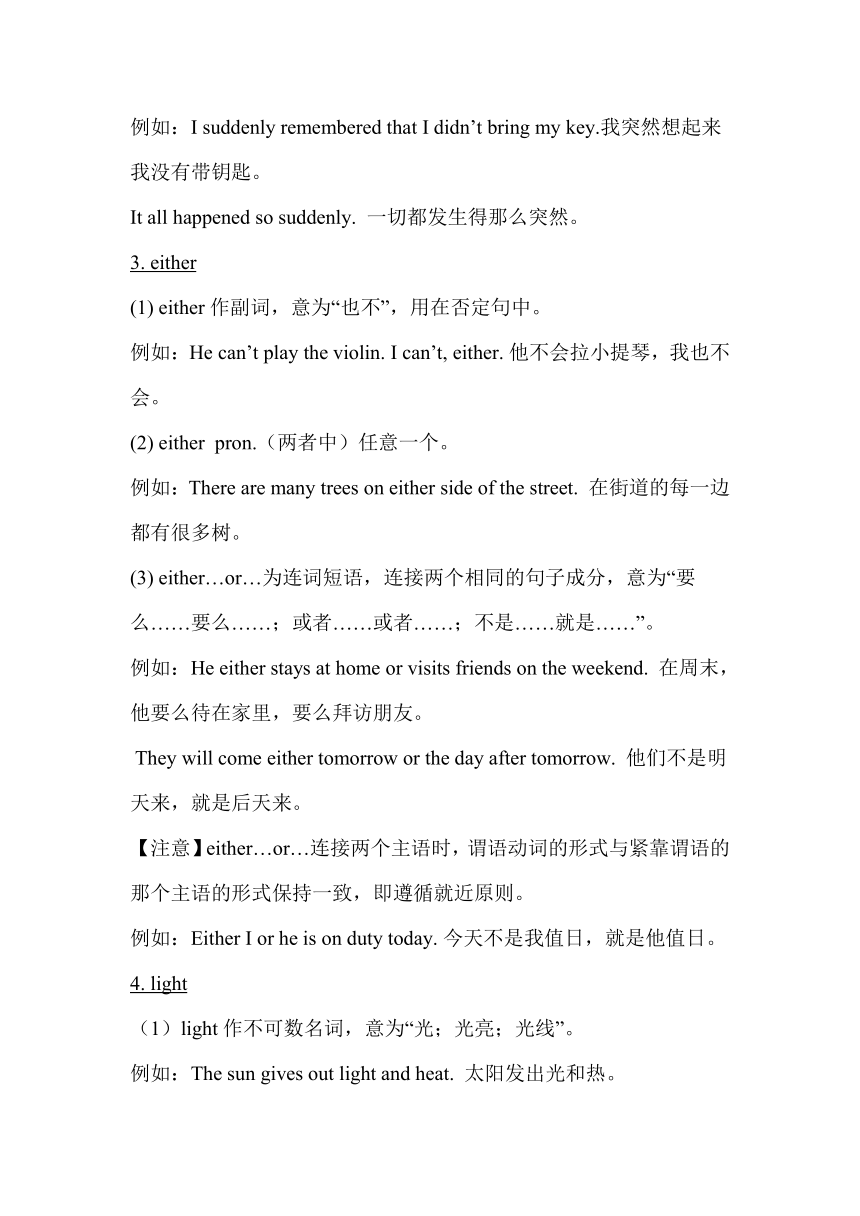
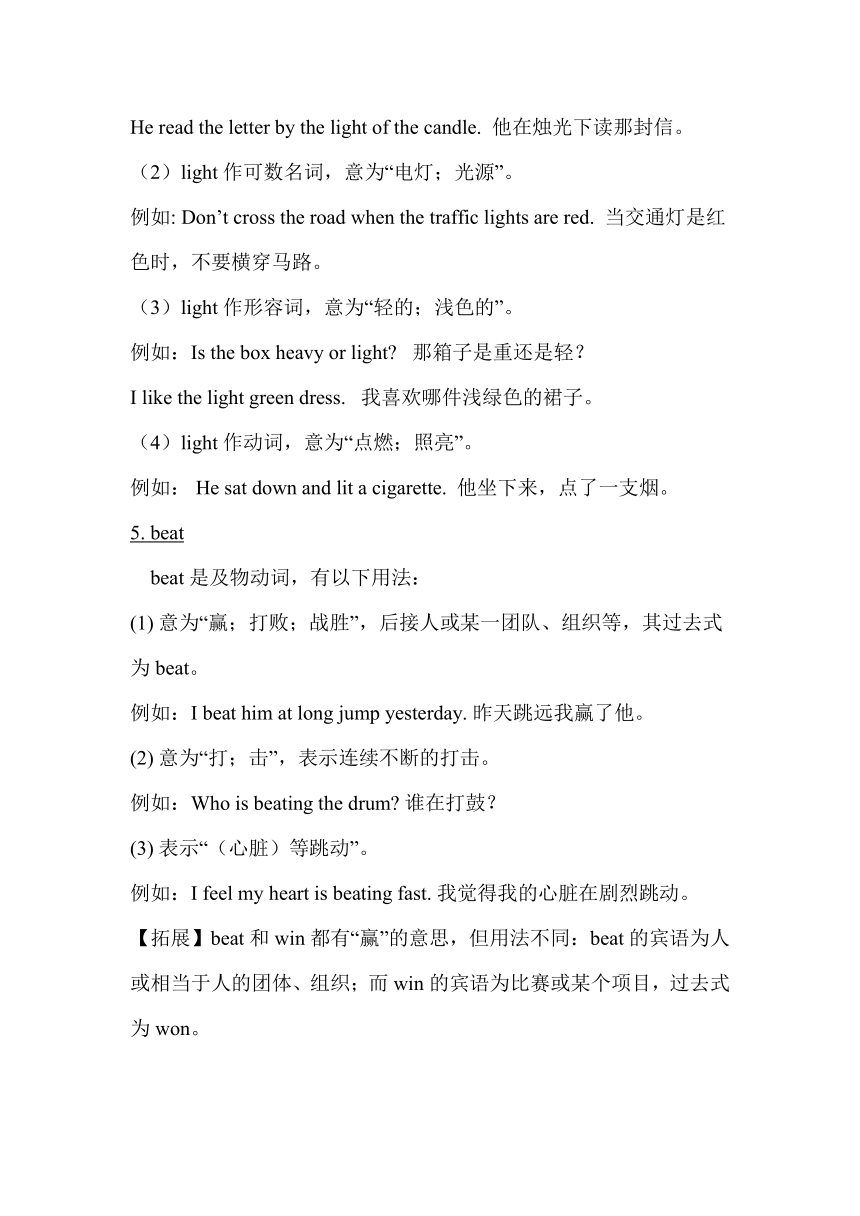
文档简介
人教版八年级下册英语Unit 5 知识点(含短语+句型+精讲+作文)
Unit 5 What were you doing when the rainstorm came
一、重点短语
1.make sure 确信;确认
2.beat against... 拍打……
3. fall asleep 进人梦乡;睡着
4. die down 逐渐变弱;逐渐消失
5. wake up 醒来
6. in a mess 一团糟
7. break...apart 使……分离
8. in times of difficulty 在困难的时候
9. at the time of 当.......时候
10. go off (闹钟)发出响声
11. take a hot shower 洗热水澡
12. miss the bus 错过公交车
13. pick up 接电话
14. bring... together 使……靠拢
15. in the area 在这个地区
16. miss the event 错过这个事件
17. by the side of the road 在路边
18. the Animal Helpline 动物保护热线
19. walk by 走路经过
20. make one’s way to.... 在某人去……的路上
21. hear the news 听到这个消息
22.important events in history 历史上的重大事件
23.for example 例如
24.be killed 被杀害
25. over 50 50多(岁)
26. a school pupil 一个小学生
27. on the radio 通过广播
28.in silence 沉默;无声
29.more recently 最近地;新近
30.the World Trade Center 世贸中心
31.take down 拆除;摧毁
32.have meaning to 对……有意义
33.remember doing sth. 记得做过某事
34.at first 首先;最初
二、必背重点句
1. —What were you doing at eight last night 昨晚8点你在干什么?
— I was taking a shower. 我在洗淋浴。
2. When it began to rain, Ben was helping his mom make dinner. 当开始下雨的时候,本正在帮他妈妈做晚饭。
3. —What was Jenny doing while Linda was sleeping 琳达在睡觉的时候,珍妮正在干什么?
— While Linda was sleeping, Jenny was helping Mary with her homework. 琳达在睡觉的时候,珍妮正在帮玛丽做作业。
三、词汇讲解
1. miss
miss作动词,意为“想念,思念”。
例如: I’ll miss you when you go toCanada.你到了加拿大以后,我一定会想你。
【拓展】(1) miss作动词还有“未击中,未抓住”的意思。
例如: I tried to hit the ball but I missed. 我努力地想击中球,但却未成功。
(2) miss还可意为“未赶上,错过”,是动词。
例如: I missed the football match on TV last night. 我错过了昨天晚上电视中的足球赛。
(3) miss与like; mind; finish; enjoy; practice; be busy; stop; can’t help; give up等词一样后接动词的-ing形式。
例如:I don’t want to miss seeing that film on television tonight. 我不想错过今晚在电视上看那部影片的机会。
2. suddenly
suddenly作副词,意为“突然,忽然”,在句中多修饰动词或句子,做状语。
例如:I suddenly remembered that I didn’t bring my key.我突然想起来我没有带钥匙。
It all happened so suddenly. 一切都发生得那么突然。
3. either
(1) either作副词,意为“也不”,用在否定句中。
例如:He can’t play the violin. I can’t, either. 他不会拉小提琴,我也不会。
(2) either pron.(两者中)任意一个。
例如:There are many trees on either side of the street. 在街道的每一边都有很多树。
(3) either…or…为连词短语,连接两个相同的句子成分,意为“要么……要么……;或者……或者……;不是……就是……”。
例如:He either stays at home or visits friends on the weekend. 在周末,他要么待在家里,要么拜访朋友。
They will come either tomorrow or the day after tomorrow. 他们不是明天来,就是后天来。
【注意】either…or…连接两个主语时,谓语动词的形式与紧靠谓语的那个主语的形式保持一致,即遵循就近原则。
例如:Either I or he is on duty today. 今天不是我值日,就是他值日。
4. light
(1)light作不可数名词,意为“光;光亮;光线”。
例如:The sun gives out light and heat. 太阳发出光和热。
He read the letter by the light of the candle. 他在烛光下读那封信。
(2)light作可数名词,意为“电灯;光源”。
例如: Don’t cross the road when the traffic lights are red. 当交通灯是红色时,不要横穿马路。
(3)light作形容词,意为“轻的;浅色的”。
例如:Is the box heavy or light 那箱子是重还是轻?
I like the light green dress. 我喜欢哪件浅绿色的裙子。
(4)light作动词,意为“点燃;照亮”。
例如: He sat down and lit a cigarette. 他坐下来,点了一支烟。
5. beat
beat是及物动词,有以下用法:
(1) 意为“赢;打败;战胜”,后接人或某一团队、组织等,其过去式为beat。
例如:I beat him at long jump yesterday. 昨天跳远我赢了他。
(2) 意为“打;击”,表示连续不断的打击。
例如:Who is beating the drum 谁在打鼓?
(3) 表示“(心脏)等跳动”。
例如:I feel my heart is beating fast. 我觉得我的心脏在剧烈跳动。
【拓展】beat和win都有“赢”的意思,但用法不同:beat的宾语为人或相当于人的团体、组织;而win的宾语为比赛或某个项目,过去式为won。
例如:Though we were weak, we beat them. 虽然我们弱,但我们赢了他们。
Who won the first prize in the competition 谁在比赛中赢得了一等奖?
6. against
against是介词,其用法如下:
(1) 反对,违反。对应的反义词为for,常用于be against sb. / sth.反对某人/某事
例如: Are most people against having a part-time job 大多数人反对做兼职工作吗?
(2) 和……交战(指竞争、比赛等)。
例如:We’ll have a basketball match against the team from No. 2 Middle School next week. 下星期我们将于二中的球队举行一场篮球赛。
(3) 碰、撞、擦。
例如:Rain beats against the window. 雨打在窗户上。
(4) 倚着、靠着。
例如:There was a ladder propped up(支撑) against the wall. 一把梯子靠着墙。
(5) 防备,抗……。
例如:She saved money against old age. 她攒钱防老。
(6) 逆着……。
例如:We are sailing against the wind. 我们(的船)正逆风航行。
(7) 衬托,相映,对照。
例如: Red flags stand out brightly against the blue sky. 红旗在蓝天的衬托下显得分外鲜艳。
7. try
try作动词,意为“尝试,努力”。主要用法如下:
(1) try to do sth. 意为“设法去做某事,尽量去做某事”,其否定形式为try not to do sth.。
例如:Try not to be late again. 尽量别再迟到了。
Try to get here in two hours.尽量在两小时之内到达。
(2)try doing sth. 意为“试着做某事”,强调尝试做某事。
例如:You should try eating more vegetables. 你应当试着多吃点蔬菜。
(3)try one’s best to do sth. 意为“尽某人最大努力做某事”。
例如:We should try our best to finish the work on time. 我们应该尽最大努力准时完成这项工作。
8. hard/hardly
hardly和hard形式上很接近,但意义截然不同。
(1)hard作形容词时,意为“困难的;硬的;勤奋的;严厉的;苛刻的”。hard作副词时常用来表示程度,意为“努力地;猛烈地;剧烈地”。
例如:I work hard at school. 我在学校努力学习。
This ground is too hard to dig. 这块地太硬,挖不动。
They tried hard to succeed. 他们努力工作,以求得成功。
【拓展】work hard at…意为“努力于……”。
例如:He is working hard at English. 他正在努力学习英语。(2)hardly是表频率的副词,意为“几乎不;几乎没有”,相当于almost not,并非hard的副词形式。
例如:There is hardly any coffee left. = There’s almost no coffee left. 几乎没有剩余的咖啡了。
四、重点句型解析
1. When he woke up, the sun was rising.
was rising意为“正在升起”,为过去进行时态,该时态表示在过去某时间某动作正在发生,由“助动词was/were + doing”构成。
例如:
They were playing in the park.他们正在公园里玩。
She was reading a book when I came in.我进来时她正在看书。
2. But luckily, the driver was fine.
luckily作副词,意为“幸运地;幸亏”,做状语。
例如:
Luckily,she found my book.幸运的是,她找到了我的书。
Luckily, we caught the last train. 很幸运,我们搭上了末班火车。
【拓展】
(1)lucky作形容词,意为“幸运的;有好运的”。
例如:
Some people seem to be always lucky.有些人似乎总是很幸运。
Nine is my lucky number.9是我的幸运数字。
(2)luck作不可数名词,意为“好运;幸运;运气”。
例如:
I hope it will bring you luck.我希望它会给你带来好运。
Good luck to you!祝你好运!
3. The roads were icy…
icy作形容词,意为“结冰的;冰冷的;冷淡的”。
例如:
It’s not easy to walk on the icy roads.在结冰的路面上行走不容易。
Because of the icy street, they can’t drive the car.因为街上结满了冰,他们不能开车。
Most people don’t want to swim in the icy water.大多数人都不想在冰冷的水里游泳。
【拓展】
ice作不可数名词,意为“冰”。
例如:
The ice is thick enough to skate on.这冰够厚的,可以在上面滑冰。
The boy isn’t afraid of cold. He is holding a piece of ice.这个男孩不怕冷,手里握着一块冰。
4. But when I pointed it out to my friend…
point out意为“指出”,是“动词+副词”结构,人称代词作宾语时应放在动词之后、副词之前。
例如:
There is a mistake in this sentence. Can you point it out 这个句子有一处错误,你能把它指出来吗?
He pointed out the woman from these photos. 他从这些照片中指出了那个女子。
【拓展】
(1)point作不及物动词,意为“指;指向”,常与介词at,to,towards等连用,表示“指向某位置或方向”。
例如:
She pointed at me, laughing.她指着我笑。
(2)point作可数名词,意为“点;要点”。
例如:
Let’s discuss the difficult points in the passage.让我们讨论一下文中的难点。
5. Why did you call so many times
so many 意为“那么多”,修饰复数名词。
例如:
He has so many friends.他有那么多的朋友。
There are so many people in the exhibition. 展览会上有那么多人。
6. My alarm didn’t go off. 我的闹钟没有响。
go off 意为“(闹钟)发出响声”go off 还有“离开”和“变质”
(1)Bob went off to get a drink. 鲍勃拿饮料去了。
(2)Meat goes off quickly in hot weather.热天肉变质得快。
【拓展】
go away 离开;go over 复习;go back 回去;go on 继续;go through 穿过;go by (时间)流逝
7. I called at seven and you didn’t pick up.
pick up 接电话
【归纳】pick up还有如下含义
(1)pick up 捡起;拾起Please pick up the ruler on the ground.请把地上的尺子捡起来。
(2)搭载,载人My mother agreed to drive her new car to pick me up.我妈妈同意开着她的新车来接我。
五、语法讲解
1.过去进行时
(1)定义
表示在过去某一时刻或某一时间段内正在进行或发生的 动作。
(2)构成:was/were doing
(3)常用时间状语
at that time, at this time yesterday, at 8:00 yesterday morning等
(4)基本句式结构
a. 肯定句:
主语+was/were+doing+其他.
b. 否定句:
主语+wasn’t/weren’t+doing+其他.
c. 一般疑问句:
Was/Were+主语+doing+其他?
肯定回答:Yes,主语+was/were.
否定回答:No,主语+wasn’t/weren’t.
2. when与while引导的时间状语从句
when和while都可用作连词,意为“当…时候”,都可用来引导时间状语从句,其区别如下:
(1)When既可以指时间点也可指时间段,其从句的谓语动词可以是延续性的,也可以是非延续性的。
例如:
When I arrived at the station, they were waiting for me.当我到达车站时,他们正等着我。
(2)While指时间段,其从句的谓语动词必须是延续性的。
例如:
While I was waiting for the bus, I met her.当我在等公交车时,我碰到了她。
They were rowing boats while we were climbing the hill.当我们在爬山时,他们正在划船。
3. 辨析asleep, sleep, sleepy和sleeping
(1)asleep adj. 睡着的 be/fall asleep 睡着
(2)sleep v. 入睡 go to sleep 入睡;
sleep n. 睡眠 have a good sleep 睡个好觉
(3)sleepy adj. 困倦的,想睡的 feel sleepy感到困倦
(4)sleeping adj. 供睡觉的 sleeping bag 睡袋
六、写作积累
1.本单元教材写作情境为"讲述令你难忘的一件事 An unforgettable experience",属于"人与自我"主题范畴中的"生活与学习"这一主题群,涉及子主题"丰富、充实、积极向上的生活"。此类写作要求学生能够恰当运用"was/were+v-ing"及引导时间状语从句的连词when/while,讲述自己在过去某一时刻或一段时间正在进行的动作,通常以一般过去时和过去进行时为主。
2.短语积累
众所周知 as we all know
忙于做某事 be busy with
开始去做某事 began to do sth
像平常一样 as usual
突然 all of a sudden=suddenly
试着做某事 try to do sth
让sb做某事 make sb do
做sth是重要的 It's important to do
教sb去做某事 each somebody to do
寻求sb的帮助 ask somebody for help
想要放弃 want to give up
能够做某事 be able to do
继续去做某事 continue to do something
首先 at first = first of all
靠某人自己 on my own = depend on oneself
练习做某事 practice doing something
下雨下的大 rain heavily
主动提供去做某事 offer to do sth
经历之后 through that experience
俗话说得好 as an old saying goes
允许某人去做某事 allow sb to do sth
害怕做某事 be afraid of doing sth= be afraid to do sth
对sth有好处 be good for
做某事有困难 have difficulty/problem/trouble doing sth
在我看来 in my opinion
花费时间做某事 spend time doing sth
3.加分谚语
The more we do, the more we can do. 做的越多,能力越大。
It's hard to beat someone who never gives up. 坚持就是胜利。
There is no rainbow without the rain. 不经历风雨,怎能见彩虹。
Believe in yourself and you will be unstoppable. 自信者勇往直前。
Action is the key to all successes. 行动是成功的关键。
Keep on going and never give up/ Never say never. 永不言弃。
Practice makes perfect. 熟能生巧。
Failure is the mother of success. 失败乃成功之母。
Go big or go home. 全力以赴。
God helps those who help themselves. 天道酬勤。
Where there is a will, there is a way. 有志者,事竟成。
No pains, no gains. 没有付出,没有回报。
There is no royal road to learning. 书山有路勤为径,学海无涯苦作舟。
Nothing is difficult if you put your heart into it. 世上无难事,只怕无难事。
No sweet without sweat.
苦尽甘来。
A journey of a thousand miles begins with a single step. 千里之行,始于足下。
4.范文
1
An Unforgettable Experience
一个难忘的经历——学骑自行车
Although there are many unforgettable things in my life. I will never forget the day when I learned to ride a bike(学着骑自行车) for the first time.On that day, my grandfather offered to teach me how to ride a bike. At first, he held on to the back of the bike(扶着后座). After a few minutes, I thought I could ride on my own, so I asked him not to help me. However, I fell off my bike(从自行车上摔下来). At that moment, I felt so angry that I wanted to give up. But my grandfather told me, "Never give up easily(不要轻易放弃). Failure is the mother of success. I'm sure you can do it." With his encouragement(有了他的鼓励), I regained my confidence(重拾信心). Finally, with enough practice, I was able to ride a bike!Through that experience, I learn that we should continue to work hard no matter what happens.
2
An Unforgettable person
一个难忘的人——英语老师
In my daily life, the most unforgettable person is my English teacher.One day, my teacher invited me to take part in an English dubbing competition(参加英语配音比赛). I refused at first because of my poor spoken English(口语差). But she told me if I didn't take that step forward, I would never know what I could achieve. She promised that she would practice with me together. In the next two months, we often practiced the same sentences over and over again in order to(为了) speak like a native speaker(当地人). With 60 days' hard work, I finally won the third prize. I asked her why she chose me. She said I was good at catching different emotions(捕捉不同的情感) and had a nice voice.Now I am a part-time voice actor(兼职配音演员).Thanks to her encouragement(多亏了她的鼓励), I found a shining point in myself(发现了自己的闪光点).
3
An unforgettable experience
一次难忘的经历——爬山
How time flies. During my life, there was one thing I will never forget. I still remember that day last summer in thaian with my father and I went mountain climbing together. We started early in the morning, but it began raining halfway(中途开始下雨). I got all wet through(全身湿透), feeling cold and tired so I couldn't help complaining(情不自禁的抱怨) and wanted to give up. However, my father encouraged me not to give up and put his coat on me softly. He really cheered me up(让我开心). We got the top at last and enjoyed the beauty of the nature that I had never seen.From that, I knew I should never give up in the face of difficulty.
Unit 5 What were you doing when the rainstorm came
一、重点短语
1.make sure 确信;确认
2.beat against... 拍打……
3. fall asleep 进人梦乡;睡着
4. die down 逐渐变弱;逐渐消失
5. wake up 醒来
6. in a mess 一团糟
7. break...apart 使……分离
8. in times of difficulty 在困难的时候
9. at the time of 当.......时候
10. go off (闹钟)发出响声
11. take a hot shower 洗热水澡
12. miss the bus 错过公交车
13. pick up 接电话
14. bring... together 使……靠拢
15. in the area 在这个地区
16. miss the event 错过这个事件
17. by the side of the road 在路边
18. the Animal Helpline 动物保护热线
19. walk by 走路经过
20. make one’s way to.... 在某人去……的路上
21. hear the news 听到这个消息
22.important events in history 历史上的重大事件
23.for example 例如
24.be killed 被杀害
25. over 50 50多(岁)
26. a school pupil 一个小学生
27. on the radio 通过广播
28.in silence 沉默;无声
29.more recently 最近地;新近
30.the World Trade Center 世贸中心
31.take down 拆除;摧毁
32.have meaning to 对……有意义
33.remember doing sth. 记得做过某事
34.at first 首先;最初
二、必背重点句
1. —What were you doing at eight last night 昨晚8点你在干什么?
— I was taking a shower. 我在洗淋浴。
2. When it began to rain, Ben was helping his mom make dinner. 当开始下雨的时候,本正在帮他妈妈做晚饭。
3. —What was Jenny doing while Linda was sleeping 琳达在睡觉的时候,珍妮正在干什么?
— While Linda was sleeping, Jenny was helping Mary with her homework. 琳达在睡觉的时候,珍妮正在帮玛丽做作业。
三、词汇讲解
1. miss
miss作动词,意为“想念,思念”。
例如: I’ll miss you when you go toCanada.你到了加拿大以后,我一定会想你。
【拓展】(1) miss作动词还有“未击中,未抓住”的意思。
例如: I tried to hit the ball but I missed. 我努力地想击中球,但却未成功。
(2) miss还可意为“未赶上,错过”,是动词。
例如: I missed the football match on TV last night. 我错过了昨天晚上电视中的足球赛。
(3) miss与like; mind; finish; enjoy; practice; be busy; stop; can’t help; give up等词一样后接动词的-ing形式。
例如:I don’t want to miss seeing that film on television tonight. 我不想错过今晚在电视上看那部影片的机会。
2. suddenly
suddenly作副词,意为“突然,忽然”,在句中多修饰动词或句子,做状语。
例如:I suddenly remembered that I didn’t bring my key.我突然想起来我没有带钥匙。
It all happened so suddenly. 一切都发生得那么突然。
3. either
(1) either作副词,意为“也不”,用在否定句中。
例如:He can’t play the violin. I can’t, either. 他不会拉小提琴,我也不会。
(2) either pron.(两者中)任意一个。
例如:There are many trees on either side of the street. 在街道的每一边都有很多树。
(3) either…or…为连词短语,连接两个相同的句子成分,意为“要么……要么……;或者……或者……;不是……就是……”。
例如:He either stays at home or visits friends on the weekend. 在周末,他要么待在家里,要么拜访朋友。
They will come either tomorrow or the day after tomorrow. 他们不是明天来,就是后天来。
【注意】either…or…连接两个主语时,谓语动词的形式与紧靠谓语的那个主语的形式保持一致,即遵循就近原则。
例如:Either I or he is on duty today. 今天不是我值日,就是他值日。
4. light
(1)light作不可数名词,意为“光;光亮;光线”。
例如:The sun gives out light and heat. 太阳发出光和热。
He read the letter by the light of the candle. 他在烛光下读那封信。
(2)light作可数名词,意为“电灯;光源”。
例如: Don’t cross the road when the traffic lights are red. 当交通灯是红色时,不要横穿马路。
(3)light作形容词,意为“轻的;浅色的”。
例如:Is the box heavy or light 那箱子是重还是轻?
I like the light green dress. 我喜欢哪件浅绿色的裙子。
(4)light作动词,意为“点燃;照亮”。
例如: He sat down and lit a cigarette. 他坐下来,点了一支烟。
5. beat
beat是及物动词,有以下用法:
(1) 意为“赢;打败;战胜”,后接人或某一团队、组织等,其过去式为beat。
例如:I beat him at long jump yesterday. 昨天跳远我赢了他。
(2) 意为“打;击”,表示连续不断的打击。
例如:Who is beating the drum 谁在打鼓?
(3) 表示“(心脏)等跳动”。
例如:I feel my heart is beating fast. 我觉得我的心脏在剧烈跳动。
【拓展】beat和win都有“赢”的意思,但用法不同:beat的宾语为人或相当于人的团体、组织;而win的宾语为比赛或某个项目,过去式为won。
例如:Though we were weak, we beat them. 虽然我们弱,但我们赢了他们。
Who won the first prize in the competition 谁在比赛中赢得了一等奖?
6. against
against是介词,其用法如下:
(1) 反对,违反。对应的反义词为for,常用于be against sb. / sth.反对某人/某事
例如: Are most people against having a part-time job 大多数人反对做兼职工作吗?
(2) 和……交战(指竞争、比赛等)。
例如:We’ll have a basketball match against the team from No. 2 Middle School next week. 下星期我们将于二中的球队举行一场篮球赛。
(3) 碰、撞、擦。
例如:Rain beats against the window. 雨打在窗户上。
(4) 倚着、靠着。
例如:There was a ladder propped up(支撑) against the wall. 一把梯子靠着墙。
(5) 防备,抗……。
例如:She saved money against old age. 她攒钱防老。
(6) 逆着……。
例如:We are sailing against the wind. 我们(的船)正逆风航行。
(7) 衬托,相映,对照。
例如: Red flags stand out brightly against the blue sky. 红旗在蓝天的衬托下显得分外鲜艳。
7. try
try作动词,意为“尝试,努力”。主要用法如下:
(1) try to do sth. 意为“设法去做某事,尽量去做某事”,其否定形式为try not to do sth.。
例如:Try not to be late again. 尽量别再迟到了。
Try to get here in two hours.尽量在两小时之内到达。
(2)try doing sth. 意为“试着做某事”,强调尝试做某事。
例如:You should try eating more vegetables. 你应当试着多吃点蔬菜。
(3)try one’s best to do sth. 意为“尽某人最大努力做某事”。
例如:We should try our best to finish the work on time. 我们应该尽最大努力准时完成这项工作。
8. hard/hardly
hardly和hard形式上很接近,但意义截然不同。
(1)hard作形容词时,意为“困难的;硬的;勤奋的;严厉的;苛刻的”。hard作副词时常用来表示程度,意为“努力地;猛烈地;剧烈地”。
例如:I work hard at school. 我在学校努力学习。
This ground is too hard to dig. 这块地太硬,挖不动。
They tried hard to succeed. 他们努力工作,以求得成功。
【拓展】work hard at…意为“努力于……”。
例如:He is working hard at English. 他正在努力学习英语。(2)hardly是表频率的副词,意为“几乎不;几乎没有”,相当于almost not,并非hard的副词形式。
例如:There is hardly any coffee left. = There’s almost no coffee left. 几乎没有剩余的咖啡了。
四、重点句型解析
1. When he woke up, the sun was rising.
was rising意为“正在升起”,为过去进行时态,该时态表示在过去某时间某动作正在发生,由“助动词was/were + doing”构成。
例如:
They were playing in the park.他们正在公园里玩。
She was reading a book when I came in.我进来时她正在看书。
2. But luckily, the driver was fine.
luckily作副词,意为“幸运地;幸亏”,做状语。
例如:
Luckily,she found my book.幸运的是,她找到了我的书。
Luckily, we caught the last train. 很幸运,我们搭上了末班火车。
【拓展】
(1)lucky作形容词,意为“幸运的;有好运的”。
例如:
Some people seem to be always lucky.有些人似乎总是很幸运。
Nine is my lucky number.9是我的幸运数字。
(2)luck作不可数名词,意为“好运;幸运;运气”。
例如:
I hope it will bring you luck.我希望它会给你带来好运。
Good luck to you!祝你好运!
3. The roads were icy…
icy作形容词,意为“结冰的;冰冷的;冷淡的”。
例如:
It’s not easy to walk on the icy roads.在结冰的路面上行走不容易。
Because of the icy street, they can’t drive the car.因为街上结满了冰,他们不能开车。
Most people don’t want to swim in the icy water.大多数人都不想在冰冷的水里游泳。
【拓展】
ice作不可数名词,意为“冰”。
例如:
The ice is thick enough to skate on.这冰够厚的,可以在上面滑冰。
The boy isn’t afraid of cold. He is holding a piece of ice.这个男孩不怕冷,手里握着一块冰。
4. But when I pointed it out to my friend…
point out意为“指出”,是“动词+副词”结构,人称代词作宾语时应放在动词之后、副词之前。
例如:
There is a mistake in this sentence. Can you point it out 这个句子有一处错误,你能把它指出来吗?
He pointed out the woman from these photos. 他从这些照片中指出了那个女子。
【拓展】
(1)point作不及物动词,意为“指;指向”,常与介词at,to,towards等连用,表示“指向某位置或方向”。
例如:
She pointed at me, laughing.她指着我笑。
(2)point作可数名词,意为“点;要点”。
例如:
Let’s discuss the difficult points in the passage.让我们讨论一下文中的难点。
5. Why did you call so many times
so many 意为“那么多”,修饰复数名词。
例如:
He has so many friends.他有那么多的朋友。
There are so many people in the exhibition. 展览会上有那么多人。
6. My alarm didn’t go off. 我的闹钟没有响。
go off 意为“(闹钟)发出响声”go off 还有“离开”和“变质”
(1)Bob went off to get a drink. 鲍勃拿饮料去了。
(2)Meat goes off quickly in hot weather.热天肉变质得快。
【拓展】
go away 离开;go over 复习;go back 回去;go on 继续;go through 穿过;go by (时间)流逝
7. I called at seven and you didn’t pick up.
pick up 接电话
【归纳】pick up还有如下含义
(1)pick up 捡起;拾起Please pick up the ruler on the ground.请把地上的尺子捡起来。
(2)搭载,载人My mother agreed to drive her new car to pick me up.我妈妈同意开着她的新车来接我。
五、语法讲解
1.过去进行时
(1)定义
表示在过去某一时刻或某一时间段内正在进行或发生的 动作。
(2)构成:was/were doing
(3)常用时间状语
at that time, at this time yesterday, at 8:00 yesterday morning等
(4)基本句式结构
a. 肯定句:
主语+was/were+doing+其他.
b. 否定句:
主语+wasn’t/weren’t+doing+其他.
c. 一般疑问句:
Was/Were+主语+doing+其他?
肯定回答:Yes,主语+was/were.
否定回答:No,主语+wasn’t/weren’t.
2. when与while引导的时间状语从句
when和while都可用作连词,意为“当…时候”,都可用来引导时间状语从句,其区别如下:
(1)When既可以指时间点也可指时间段,其从句的谓语动词可以是延续性的,也可以是非延续性的。
例如:
When I arrived at the station, they were waiting for me.当我到达车站时,他们正等着我。
(2)While指时间段,其从句的谓语动词必须是延续性的。
例如:
While I was waiting for the bus, I met her.当我在等公交车时,我碰到了她。
They were rowing boats while we were climbing the hill.当我们在爬山时,他们正在划船。
3. 辨析asleep, sleep, sleepy和sleeping
(1)asleep adj. 睡着的 be/fall asleep 睡着
(2)sleep v. 入睡 go to sleep 入睡;
sleep n. 睡眠 have a good sleep 睡个好觉
(3)sleepy adj. 困倦的,想睡的 feel sleepy感到困倦
(4)sleeping adj. 供睡觉的 sleeping bag 睡袋
六、写作积累
1.本单元教材写作情境为"讲述令你难忘的一件事 An unforgettable experience",属于"人与自我"主题范畴中的"生活与学习"这一主题群,涉及子主题"丰富、充实、积极向上的生活"。此类写作要求学生能够恰当运用"was/were+v-ing"及引导时间状语从句的连词when/while,讲述自己在过去某一时刻或一段时间正在进行的动作,通常以一般过去时和过去进行时为主。
2.短语积累
众所周知 as we all know
忙于做某事 be busy with
开始去做某事 began to do sth
像平常一样 as usual
突然 all of a sudden=suddenly
试着做某事 try to do sth
让sb做某事 make sb do
做sth是重要的 It's important to do
教sb去做某事 each somebody to do
寻求sb的帮助 ask somebody for help
想要放弃 want to give up
能够做某事 be able to do
继续去做某事 continue to do something
首先 at first = first of all
靠某人自己 on my own = depend on oneself
练习做某事 practice doing something
下雨下的大 rain heavily
主动提供去做某事 offer to do sth
经历之后 through that experience
俗话说得好 as an old saying goes
允许某人去做某事 allow sb to do sth
害怕做某事 be afraid of doing sth= be afraid to do sth
对sth有好处 be good for
做某事有困难 have difficulty/problem/trouble doing sth
在我看来 in my opinion
花费时间做某事 spend time doing sth
3.加分谚语
The more we do, the more we can do. 做的越多,能力越大。
It's hard to beat someone who never gives up. 坚持就是胜利。
There is no rainbow without the rain. 不经历风雨,怎能见彩虹。
Believe in yourself and you will be unstoppable. 自信者勇往直前。
Action is the key to all successes. 行动是成功的关键。
Keep on going and never give up/ Never say never. 永不言弃。
Practice makes perfect. 熟能生巧。
Failure is the mother of success. 失败乃成功之母。
Go big or go home. 全力以赴。
God helps those who help themselves. 天道酬勤。
Where there is a will, there is a way. 有志者,事竟成。
No pains, no gains. 没有付出,没有回报。
There is no royal road to learning. 书山有路勤为径,学海无涯苦作舟。
Nothing is difficult if you put your heart into it. 世上无难事,只怕无难事。
No sweet without sweat.
苦尽甘来。
A journey of a thousand miles begins with a single step. 千里之行,始于足下。
4.范文
1
An Unforgettable Experience
一个难忘的经历——学骑自行车
Although there are many unforgettable things in my life. I will never forget the day when I learned to ride a bike(学着骑自行车) for the first time.On that day, my grandfather offered to teach me how to ride a bike. At first, he held on to the back of the bike(扶着后座). After a few minutes, I thought I could ride on my own, so I asked him not to help me. However, I fell off my bike(从自行车上摔下来). At that moment, I felt so angry that I wanted to give up. But my grandfather told me, "Never give up easily(不要轻易放弃). Failure is the mother of success. I'm sure you can do it." With his encouragement(有了他的鼓励), I regained my confidence(重拾信心). Finally, with enough practice, I was able to ride a bike!Through that experience, I learn that we should continue to work hard no matter what happens.
2
An Unforgettable person
一个难忘的人——英语老师
In my daily life, the most unforgettable person is my English teacher.One day, my teacher invited me to take part in an English dubbing competition(参加英语配音比赛). I refused at first because of my poor spoken English(口语差). But she told me if I didn't take that step forward, I would never know what I could achieve. She promised that she would practice with me together. In the next two months, we often practiced the same sentences over and over again in order to(为了) speak like a native speaker(当地人). With 60 days' hard work, I finally won the third prize. I asked her why she chose me. She said I was good at catching different emotions(捕捉不同的情感) and had a nice voice.Now I am a part-time voice actor(兼职配音演员).Thanks to her encouragement(多亏了她的鼓励), I found a shining point in myself(发现了自己的闪光点).
3
An unforgettable experience
一次难忘的经历——爬山
How time flies. During my life, there was one thing I will never forget. I still remember that day last summer in thaian with my father and I went mountain climbing together. We started early in the morning, but it began raining halfway(中途开始下雨). I got all wet through(全身湿透), feeling cold and tired so I couldn't help complaining(情不自禁的抱怨) and wanted to give up. However, my father encouraged me not to give up and put his coat on me softly. He really cheered me up(让我开心). We got the top at last and enjoyed the beauty of the nature that I had never seen.From that, I knew I should never give up in the face of difficulty.
同课章节目录
- Unit 1 What's the matter?
- Section A
- Section B
- Unit 2 I'll help to clean up the city parks.
- Section A
- Section B
- Unit 3 Could you please clean your room?
- Section A
- Section B
- Unit 4 Why don't you talk to your parents?
- Section A
- Section B
- Unit 5 What were you doing when the rainstorm came
- Section A
- Section B
- Review of Units 1-5
- Unit 6 An old man tried to move the mountains.
- Section A
- Section B
- Unit 7 What's the highest mountain in the world?
- Section A
- Section B
- Unit 8 Have you read Treasure Island yet?
- Section A
- Section B
- Unit 9 Have you ever been to a museum?
- Section A
- Section B
- Unit 10 I've had this bike for three years.
- Section A
- Section B
